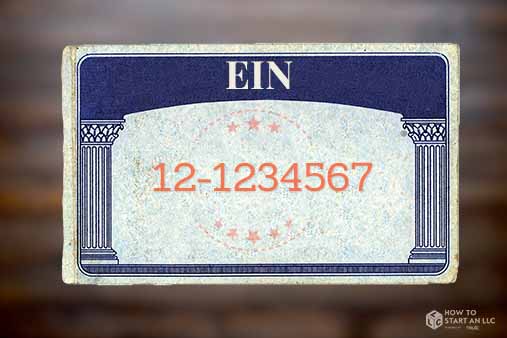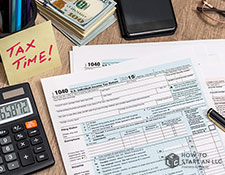7 BENEFITS OF GETTING AN EIN
An Employer Identification Number (EIN), or Federal Tax ID Number, is like a social security number for your business. The EIN allows the IRS to keep track of a business’s tax reporting.
Visit our What is an EIN guide to learn more about when you are required to have an EIN and how to get one.
We recommend waiting to apply for an EIN until you’ve formed your business. Our LLC before EIN article explains why and will help you get started.

EIN BENEFITS
No matter what kind of business you have, it’s usually a good idea to get an EIN. You can apply for one through the EIN Assistant on the IRS website.
You won’t be wasting your time; it’s a free and simple process that comes with several benefits:
1. File Tax Returns
If your business is a partnership, a multi-member LLC, or if you have employees, an EIN is required in order to file taxes. It is the identification you will use when you file your company taxes with the IRS at the end of the year. Every financial decision made on your business’s behalf will be tied to its EIN. If you apply for one as soon as possible, you won’t have to deal with the risk of missing tax deadlines.
2. Hire Employees
If your business has employees, you will need to get an EIN since a multi-member LLC does not file or pay taxes as the LLC; instead, each employee will file their taxes separately under the LLC’s 1040 form. Employers need an EIN to set up payroll, and the IRS will use the business’s EIN to track payroll taxes. An EIN is necessary to register for your State’s employer taxes, like paying for workers’ compensation and withholding income taxes on behalf of your employees.
3. Maintain Corporate Veil
If you’re a single member LLC, an EIN helps you maintain your corporate veil. The corporate veil protects business owners from personal liability for the business’s debts. Keeping personal finances and professional finances separate will help prevent you from piercing the corporate veil. It will also establish credibility and professionalism by allowing your business to have its own identity separate from its owners.
4. Prevent Identity Theft
Applying for an EIN instead of using your Social Security number (SSN) will keep your SSN more private, reducing the risk of identity theft; it’s less likely for someone to break into your accounts when you keep business finances and personal finances separate. If you’re a sole proprietor without an EIN, and you continue giving out your SSN to clients or vendors, you’re putting yourself at a higher risk.
5. Open a Business Bank Account
Most banks require an EIN in order to open a business banking account. A business bank account is another way to keep your personal finances and professional finances separate. It will simplify the process of tracking and managing your professional expenses; as a result, you’ll be able to make more efficient budgeting plans for your business.
Business bank accounts will also provide you with access to finance professionals and services (e.g. payroll services, access to small business loans) that will make running your business easier. You can also sometimes open a business credit card with your bank, which comes with its own benefits.
6. Build Business Credit
Just like a Social Security number tracks your personal credit, lending and credit agencies use an EIN to track your business’s credit. Establishing strong credit will help to maintain your business’s financial stability, and applying for an EIN is an essential step. Having good business credit can lead to better interest rates, more loan qualifications, and a higher chance of expanding your company in the future.
7. Qualify for More Business Loans
Although an EIN is not required to apply for all business loans, a lot of lenders prefer a company that has established its business credit through a business bank account. You’ll have a better chance of qualifying for certain loans if you have a strong business credit. To even start establishing that credit, you need to obtain an EIN.
Concerned About Cost?
We recommend waiting to apply for an EIN until you’ve formed your business. Visit our LLC before EIN article to learn why or check out our free Form an LLC guides.
Concerned about the cost of forming an LLC?
FREQUENTLY ASKED QUESTIONS
You don’t need an EIN if you’re self-employed; you can simply use your Social Security number. However, some people who are self-employed choose to apply for an EIN instead of using their Social Security number to reduce the risk of identity theft; it’s less likely for someone to break into your accounts when you keep business finances and personal finances separate.
No, there is not a difference between an Employer Identification Number (EIN) and a Taxpayer Identification Number (TIN). Both refer to the nine-digit number issued by the IRS for your business.
No, there is not a difference between an EIN and a Federal Employer Identification Number (FEIN). A FEIN can also be referred to as a Federal Tax Identification Number.
It is very easy to look up your EIN, and there are several ways you can do so. First, the IRS will typically quickly email or send a physical letter confirming your EIN application. You can also check business documents such as tax returns to find your EIN printed there.
You can look up another business’s EIN by searching for the company on the Securities and Exchange Commission (SEC) EDGAR online Forms and Filings database.
If you still aren’t able to find your EIN by checking for a confirmation email or letter, or by identifying it on your business documents, you can simply call the IRS EIN Department at 1-800-829-4933 to speak with one of their representatives. Their hours of operation are Monday-Friday from 7 a.m. to 7 p.m.
An EIN is a nine-digit number issued by the IRS to keep track of a business’s tax reporting. The Data Universal Numbering System (DUNS) is a nine-digit number issued by Dun & Bradstreet, a business analytics company. A DUNS number helps businesses create and identify their credit reports.





